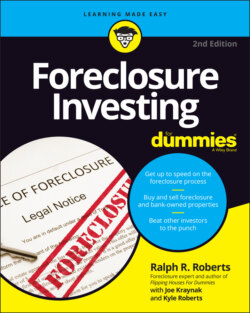Читать книгу Foreclosure Investing For Dummies - Ralph R. Roberts - Страница 48
Agreeing to a deed in lieu of foreclosure
ОглавлениеWhen homeowners have very little to no equity or even negative equity built up in their property, and they have no hope of turning the financial tide, they may offer the lender a deed in lieu of foreclosure. The homeowners agree to sign their deed over to the lender and give them the keys to the property without having to go through a messy public foreclosure process.
Although this approach may give the homeowners a less-embarrassing escape route, it often leaves the lender with a property that it doesn’t want, along with the expense of repairing and rehabbing the property and then selling it. As an investor, you may be able to step in as the ultimate middleman, negotiate with the lender, getting it to accept less than the full loan amount due (what real estate insiders call a short sale), and still provide the homeowner a clear escape route.
Some investors around the country make a really good living just working short sales. If you can’t purchase a foreclosure property for a low-enough price to make a profit, negotiating a short sale can make the deal more profitable. Keep in mind, however, that lenders won’t agree to short sales if they foresee the homeowners walking away with money, and you shouldn’t negotiate a lower payoff to put money in the pockets of the homeowners. See Chapter 15 for details.
